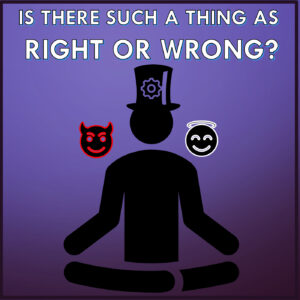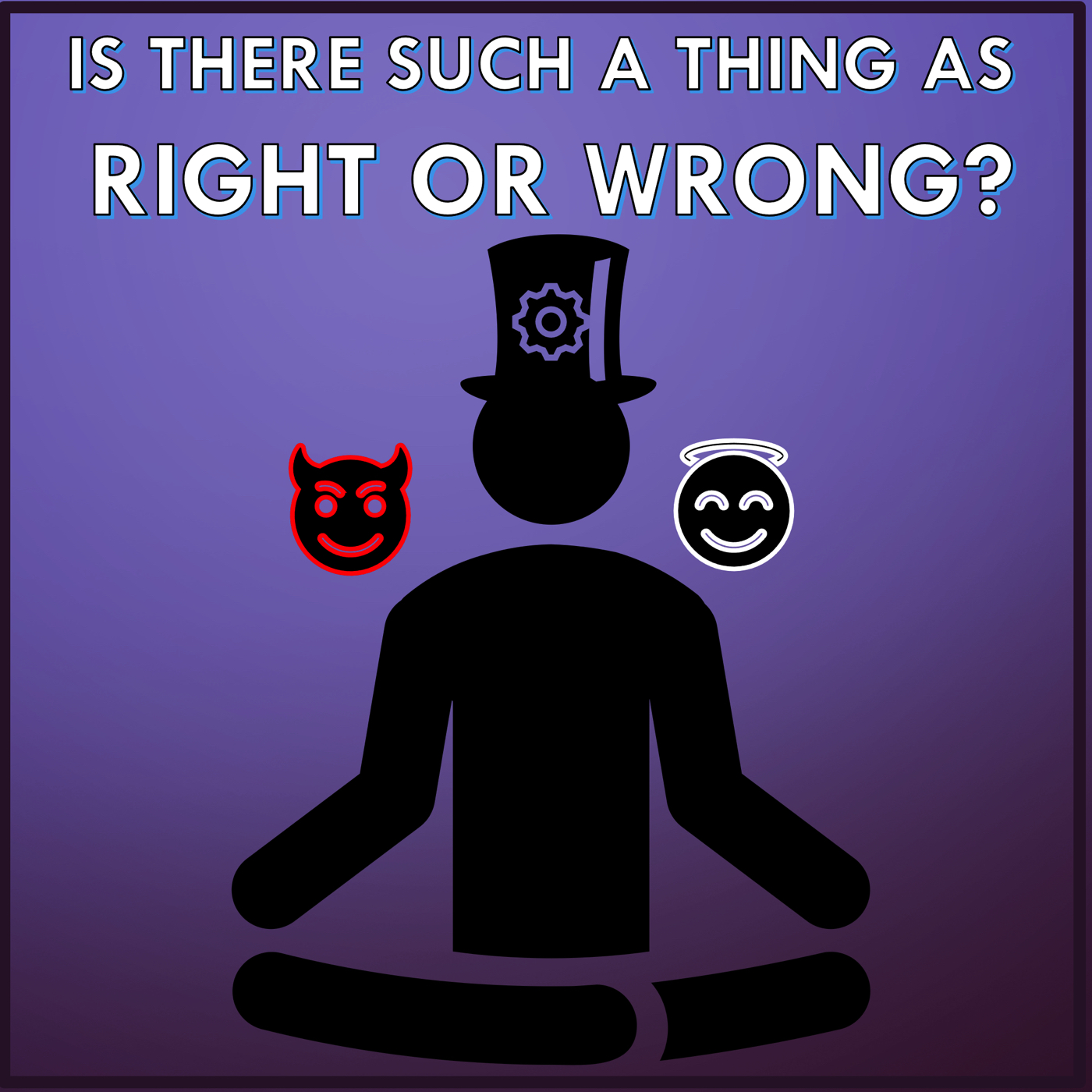
As a full time Uber and Lyft driver, at this point I’ve given over 32,000 rides to college students in and around Florida State, Florida A&M and Tallahassee Community College, often several students per trip – well over 50,000 students over the past eight years. And now with COVID fears fading away, many curious students have been asking me about my way cool top hats again. To my amazement, a good 5-10% of the conversations have led to questions about what pamalogy is. As a regular follower of my blogcast, you know it is the philosophy of awesomeness. So, when I explain that awesomeology is the philosophy of awesomeness and that maximized awesomeness is that than which there could be nothing greater, very often I find myself in a conversation about whether or not there is any such thing as good or evil, right or wrong, and so on. How can anyone objectively say that one thing is better than another? Teachers, are you aware that over half of your students do not believe there is any such thing as right or wrong? Did you teach them that? Today, we’re going to discuss what objective criteria there might be for determining with certainty what is right and wrong. Ready?
In our last blogcast, I was telling you about Aristotle’s virtue ethics. Remember? So, if it were true that there is no such thing as right or wrong, then talk about a golden mean of virtue, where a person can be too truthful, may be a subject that has fallen on deaf ears. Thirty-three years ago, I attended something called an Engagement Encounter with my present and only wife ever, Lisa. At the three day conference, there was a poster on the wall that read, “truth without kindness is cruelty.” As a happily married husband, I can tell you with certainty that there is a lot of wisdom in that. Probably the key to a lasting marriage has been the ability to forgive and let things go. Reminding people of their faults is being too truthful. I don’t want to repeatedly hear about mine. She doesn’t want to hear about hers. Easing up on heavy guilt trips helps people get along, especially married couples.
We might want to start a conversation about whether there is such a thing as right or wrong, good or bad, or that dreaded word, “evil” with the question of why it might matter. Is the idea to guilt and shame us? Or maybe the point of singling out what is right or wrong is to shape public policy or to determine whether someone is worthy of some job. Who are we hiring? Who are we voting for? We might look on their social media to see if their friends say they are liars, thieves, narcissists or sexual deviants.
And who is to say what is deviant sexually anyway? Judging others for their sexual preferences is a big “no-no” these days. But isn’t that judgement itself also a judgment? Where does judgment come from? What is it for?
Seeing that different cultures and different religious institutions held varying opinions, especially when considering the opinions of atheists after the Enlightenment, Immanuel Kant thought he could provide the world with a moral system based on pure reason, rather than tradition. He hoped to find something that everyone could agree on. As a fellow rationalist, I find myself in strong agreement that such an undertaking would be well worth looking into. I’d love to uncover a system of morality that would be impossible to question.
But there are some dirty little secrets here. For one thing, almost nobody actually ever reads Immanuel Kant. They rely on Schoepenhauer to interpret him. You’ve really got to have a lot of free time to get through his stuff. So, what most of us do, is we find the Cliff’s Notes somewhere, or maybe go to those Crash Course Philosophy YouTube blurbs with Hank Green. Or if we want to go slightly deeper, and learn about the difference between hypothetical and categorical imperatives and what sets Kant apart from Hume, Locke or Aquinas, we’ve got the Internet. Fortunately, second hand info should suffice to convey some basic concepts in a blogcast like this, where one or two takeaways is all anyone should expect in the first place. So for now, we can follow Green’s path and focus on two main ideas. It’s actually very simple. First, you shouldn’t use people. You should respect them. This rule is sort of like Jesus’ golden rule. “Do unto others as you would have them do unto you,” only it addresses a problem. Suppose what you want is something others wouldn’t want. For instance, what if you were a masochist? Would you beat people up just because you wanted to be beaten up? Instead, Kant would say you should respect their unique individuality and only beat them up if they asked you to (not that he said that. He didn’t. I’m making this up). But my point is that Kant’s rule is about disregarding what other people want. You don’t use them to get what you want without their consent. You respect others first and foremost.

Next, we have Kant’s rule of “universalizability.” This is a fancy word for saying that if everybody did it, then how would the world look? If the answer is that the world would suck that way, then the thing you might want to do, would be wrong to do. It’s a simple rule. So for example, stealing is wrong, because if everyone thought stealing was okay, then nobody would have any sense of security about their possessions, knowing that everyone was a thief, and the whole world would suck that way. Same for lying. If everyone was a liar, then there would be no basis for assuming people ever told the truth. All communication would break down. All trust would disappear. The world would suck. Therefore, we shouldn’t lie and we shouldn’t steal. It’s an imperative. It’s our duty. It’s everyone’s duty. No religion is required to know this.
Obviously, doing your duty will make you a good citizen. But there is still a question of what moral good is. The Scotch philosopher, David Hume, found following your personal passions to be a moral good. In pamalogy-speak, you should maximize your awesomeness. Be all you can be. Consider your desires and talents. Pursuing your passions is a moral imperative. You should do it. But if you take this to an extreme, Hume, (misunderstood), might even lead you to an “if it feels good, do it” philosophy. We might want to curb that with an Aristotelian golden mean. What Hume means, for example, is that if you feel sorry for that guy that’s all beat up and left on the side of the road by robbers to die, you should go help them. Your compassion is a good thing. For Hume your compassion is a moral virtue. Not so for Kant. For Kant, if you actually don’t give a hoot about that guy, but you help him despite your lack of feeling, doing it out of duty because you had understood this rationale, then what you did is a truly moral action.
Now I do think we need to give Kant some slack here. He wasn’t saying there was anything wrong with doing things you like or that you are naturally inclined to do, like loving and caring for other people. He was simply pointing out the difference between categorical imperatives, things that can objectively be considered your duty, and other sorts of things, that are entirely optional and certainly worthy of pursuit. And it’s not like we’re all in some virtue contest for moral superiority here.
To put it all very simply, Kant was just being clear about the fact that there is a category of things that are objectively right to do. They are duties. They are worth building laws around. No churches, popes, synagogues, mosques, sacred texts, prophets or any other ancient and traditional authority is required for deducing this fact.
Those are all the Kantian rules we really need for now, and that should be simple enough. We’ll add these little maxims to the balanced ecosystem of theories we’re going to keep building on as we close out season one of this blogcast. For now, let’s get back into my Uber for a minute. We were talking about awesomeness and my student said they didn’t believe there was any such thing as right or wrong. They said it was up to each individual person to decide what they believed.
Well, I don’t disagree with them on this last point. Who could expect anyone to act on something they didn’t believe? But I don’t believe that they truly believe there is no right or wrong. One way I might respond is to ask them if it would be wrong if someone came into the car with a gun, shot us both in the head and stole their wallet. Not too many on hearing this question would continue to insist that there is no objective way to determine what is right or wrong. Most would consider this morally wrong. Some things are difficult to determine. Others are not. I can think of a long list of things almost every student would agree was wrong. What about racism? Is that wrong? Most of the examples border on bad taste even to talk about – so I won’t.

But why is anything wrong? Is it a mere human construct to call murder and theft or racism wrong? For Kant, if everyone shot everyone else in the head and stole stuff, the world would suck. I don’t think many would disagree with that. When we apply the principle of what goes around comes around, I think we can all agree that Kant may have something there. No religion needs to tell us that it’s wrong. A simple, objective, moral principle can be applied. And it’s not really all that hard to understand. It certainly works for creating civil societies.
Kant’s maxim is also very useful for pointing to the maximization of awesomeness – a world that either sucks or doesn’t. You might want to call this a utilitarian argument but Kant’s system is not utilitarian because it has that ends-not-justifying-the-means thing mixed in. In ultilitarianism, the end product of maximized awesomeness is what counts. Whatever benefits the most living creatures the most ways, that’s what we should do. If some toes have to be stepped on to get there, so be it. Kant didn’t like that. He was aiming for personal ethics, where we could determine whether individual acts were right or wrong. If in order to maximize awesomeness for the whole world, a few people had to be killed, that would be morally wrong for Kant. Even though the whole world would benefit, except for these few who stood in the way, Kant would say no. Don’t do it. And yet, he did care about the benefit of the whole, as well. That’s what was at the heart of his “universalizability” maxim.
If this leaves you confused, then good. I’ve done my job. You can see that two sets of sometimes conflicting values both matter. The good of the whole, and the good of the individual. And you can see that sometimes, it is in the interest of the many to sacrifice the interest of the few; but how do we deal with those pesky little means standing in our way? Would you side with the utilitarians? The way I see it, if we are disatisfied with a solution, we are challenged to think of something better. There’s something not quite right about hurting people to get what we want, even when what we get is of greater net good. I have always found that if we look for answers hard enough and long enough, typically we will find them. There is a certain “seek and ye shall find” thing that goes on. It’s what the sprocket of ingenuity placed on the top hat of excellence and creativity is all about.
It might be something as simple as asking the few if they could please step aside. I’ve known some people who might even give their lives for the sake of the whole if they understood why they might be duty-bound to do so – our men and women in battle, for instance. Others, might assert certain perceived rights. An example that sticks out for me is Ruth Johnson and the Cat Lady, Trini Fahey. In the 1980s, I was a letter carrier in downtown West Palm Beach. All of the houses for blocks and blocks had been torn down and were ready for redevelopment. Mrs. Johnson’s house and the Cat Lady’s house were the only two left standing in the way of progress. Trini Fahey swore up and down that the developer, (whom I also knew) had poked Mrs. Johnson’s cat’s eyes out as an intimidating threat. Trini herself solemnly declared, “over my dead body will I ever leave!” She and her fifty cats had a right to stay there. She knew her rights – especially after sa battle for the lives of 47 previously confiscated cats had taken place. The Palm Beach Post portrayed her as insane and a drinker. The battle was real, but Trini’s heart was with the cats that she paid to spay, neuter and protect. To her mind, her property was the place where they felt safe. It was their territory. They had a right to be there, as did she. She even held the deed. But within a week of swearing this oath before me, the almost eighty-year-old Trini Fahey claimed one of their men raped her. She was gone a week later. Her house and her cats too.

I never knew what to make of her allegations. Deep down I can tell you that she was thinking about her cats and not about the betterment of the town as a whole, if not about justifying the out-of-the-park $5 million she was demanding. The crack houses in the neighborhood had all been cleared to her own benefit as crime had dropped dramatically. She had wanted to buy land in Loxahatchee to invite artists and musicians – a ranch. Given the deafening buzz of flies and the stomach-turning stench from the rampant waste of all those cats, I had to agree she was a little crazy thinking that, but that doesn’t mean someone just as good-hearted couldn’t have come along to donate the land she needed for her cats – and help her with her no-kill animal shelter mission. Maybe, in fact, that is exactly what happened. From my point of view, as the letter carrier with a little extra time to stop and chat since all the other houses had been torn down, is that she just disappeared. Before long, West Palm Beach was just one of the most beautiful cities in the world. How was this really handled? We may never know. But I don’t think it’s impossible to imagine some ways that it could have happened that are much nicer than others. And that’s my point. The few don’t have to be disregarded for the benefit of the many. We can agree that it would be better if everyone somehow won, not just the majority, and not just a net win.
To the extent that our decisions result in the best total possible outcome, utilitarianism is also related to something called consequentialism. We are interested not necessarily so much in what is right or wrong in the action itself as we are the consequences. For both consequentialists and utilitarians the ends can justify the means. The utilitarian wants a net positive total outcome. The consequentialist is thinking of a more specific desired consequence rather than net total affect. A consequentialist may justify stealing because stealing means gaining stuff that is desired but object to stealing for the mere reason that it is likely they might get caught. They are less interested in the net affect than in the immediate consequence. The total outcome may be good if the one they steal from never knows the item is missing, but even if they do find out, if the person stealing needs the object more and can get away with it, then the consequentialist would feel justified. This would not work at all for Kant, who would ask us to look at the maxim of universalizability. If everyone stole using that rationale, then no one would pay for anything. Commerce would have no basis and we would all starve and that would suck, so it doesn’t matter what the rationale is, don’t steal.
But stealing involves certain assumptions abouty property rights. Where do property rights come from? Maybe we should ask mountain lions. They’ll tell you it comes from winning fights with other mountain lions. Los Angeles County respects the rights of mountain lions to their territory so much that they risk the lives of children, pets and livestock, hoping to prevent the extinction of the puma. Each cat needs about two hundred square miles to call their own and they are predators – protected predators. Think about that. One, named P22, since its the 22nd tracked mountain lion, is confined to a much smaller space than average for their kind, Griffith Park. Parents, you may want to watch your children very carefully should you visit there. And please note that according to California Penal Code Section 26350 PC, it is illegal to openly carry a handgun that is exposed and unloaded on one’s person. Protection of animal species has been something of a losing battle in the anthropozoic age but at least somebody is doing something somewhere!

I sort of like asking animals about property rights. Humans are an animal species, special though we may be, and animals give us some answers about where the sense of property rights first came from. My dog loves rolling in the grass and peeing wherever she thinks she can mark her territory. Instinct matters. It’s built in. Property for trade, on the other hand, that requires some mental acrobatics.
Whether you accept a six thousand year old Earth or a 4.5 Billion year old Earth, you will likely agree that the fossil record indicates that a transformation took place between a stone age and an agricultural age among humans not long ago. Human tribes were hunter-gatherers – wanderers, protecting their clans. Then they settled down and raised farm animals, and it was only when they did that that anything like modern property rights kicked in. Prior to that, each clan shared what they could using the resources they could find. They had resource based economies. And when one clan ran into another, violence was typical if one side refused to share with the other. They had a shared expectation that anything that one tribe had collected could just as easily be recollected by the other. This is referred to as a forced-sharing economy. If one tribe was roasting a pig, another was likely to smell it and invite themselves over. Not sharing would be met with violence. That’s how animals do.
There is little reason to think people did it any other way. I wonb’t sugar coat this by looking at competing tribes as one humanity, one human family, as in Zulu tribe ubuntu. I think it is anachronistic to do that. Violence was avoided through sharing. The point I want to make is that trading was a concept that developed only after farming started. As I noted a few episodes back, when we were talking about the treatment of women as property, capitalism was the beginning of patriarchal societies and women came to be treated as their animals. Here I will only add that in the hunter-gatherer stage, clans would assert their right to fight other clans only if resources weren’t being shared. Because ot this, the sense of what was right, included a mutual expectation that the clans would share with one another, whether sex, food or other resources.
Then when people started settling on farms, one crop per plot of land at a time was typical but people still had the need to gather a variety of things. So, instead of risking their lives with violence, they started to trade. I’ll give you my wheat if you give me some apples, and so on. This was a natural process. At the same time, rulers of armies and competing forces often looted and burned cities to amass fortunes and build their kingdoms and empires. But looting was unsustainable by itself. Rulers of empires quickly learned that conquest required cooperation and that cooperation required contentment. The armies themselves, and their families, needed property of their own if they were to be content and continue to fight. Property rights naturally evolved for the sake of peace. Laws were eventually drawn up to protect property rights, and that is what we find much of in the Bible and other early documents.

Alongside this longer history, you might want to consider the philosophy of Thomas Payne on property rights. Payne took less of a historical view than a reductionist one. His theory was that one acquired the right to property by supplying something of his own to it – namely his labor. By working to pick an apple, that apple that was picked is rightly your own. Otherwise, it is common property for all. The theory is that everything that is owned by anyone can be traced back to some manner of work that was done to have earned rights to it. The fact that many things were stolen and no such tracing is practical does not undo Payne’s theory making property ownership something legitimate. Surely, if someone had added their labor to a natural resource it was somehow uniquely their own. And if they chose to trade that thing for something legitimately owned by someone else, the consent would allow plenty of variety of things owned by many people.
This theory then becomes the justification for the entire capitalist enterprise and leads to the streamlined economic theories of Adam Smith, who ushered in the industrial age with the notion that workers who repeat tasks continually are better and faster at what they do than those who have to learn new tasks.
Smith was right, but there was a problem. Workers hated their jobs. Marx pointed out that workers were alienated from their work if they didn’t own it. They were giving all of their time away for money and they were in competition with each other, prone to hate their coworkers too, who worked faster than they did or for a lower wage. It was an environment that always meant working harder for less money.
While Smith might have pointed to productivity as a way to maximize awesomeness, Marx’s view of awesomeness involved the means to that end. Kant would have had to agree with Marx on this. The ends did not at justify the means. The misery of workers was the means. Industrial capitalism is thus inherently unethical.
But if we reject capitalism and choose communism, as Marx did in his Communist Manifesto, then what is the result? It will depend on who you ask. There are many socialist apologists to be found, who turn a blind eye to historical tragedies and marked failures. They look only at the hypocrisy and failure of America and the European colonial powers to provide adequate healthcare and education equally for all.
So there we are in my Uber. My student tells me there is no such thing as right or wrong. I ask whether it would be a good thing to get medical help if they are in need. It isn’t a hard question. They most certainly know the answer is yes. How shall we pay for it? That is another question – one we will answer as we begin to discuss pamalonomies next time. I’ve been saving the best for last. Ciao!
URL for sharing this transcript page: https://pamalogy.com/2022/08/31/is-there-any-such-thing-as-good-and-bad/
URL for sharing this podcast: https://player.captivate.fm/episode/9ca7ab43-0b57-442a-8840-06c20c565fb7
URL for sharing just the audio file: https://podcasts.captivate.fm/media/7fd388d7-bec9-4540-b3f4-3b04ad0530e9/Episode21-IsThereRightandWrong-converted.mp3
Previous: Getting Along – How Happy is Mom?
Up Next: Pamalonomies in the Philosophy Pond
Bonus Video Blog: – The Quintillion Project – Pamalonomies
Background Page: – https://jamescarvin.com/the-quintillion-project-aftermath/



